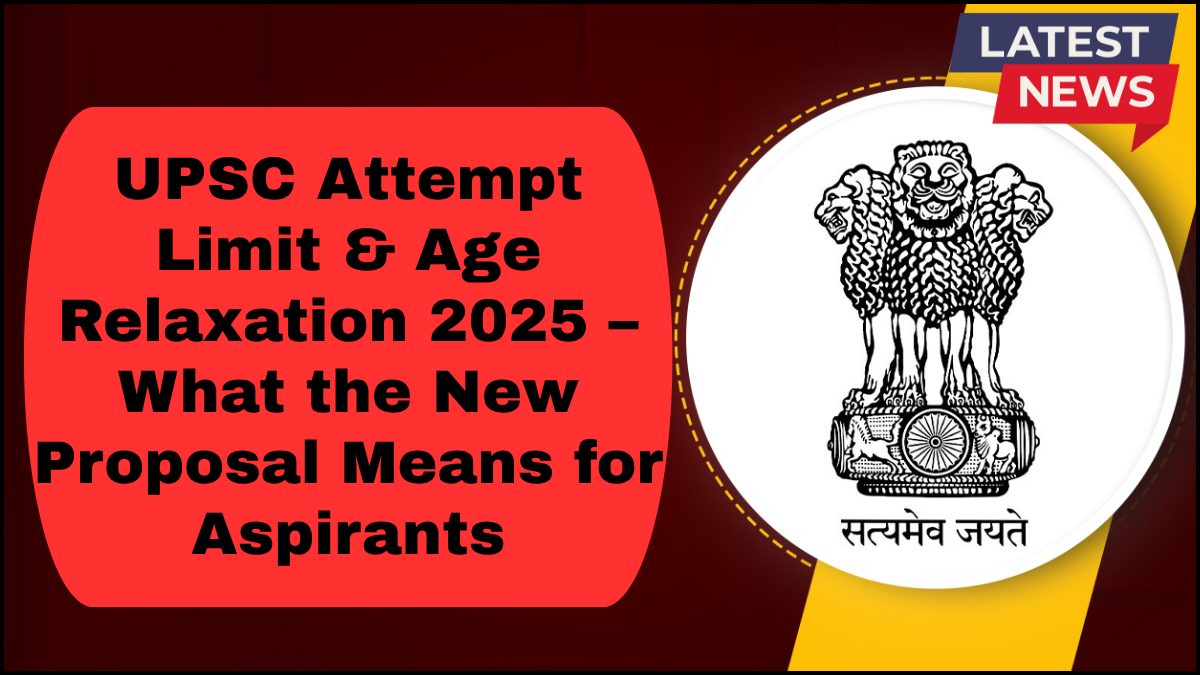The Union Public Service Commission (UPSC) is at the heart of India’s civil services recruitment process. Every year, lakhs of aspirants attempt the prestigious exam, aiming to secure posts in IAS, IPS, IFS, and other elite services. With growing competition and shifting policies, even a slight change in eligibility criteria can significantly impact aspirants. One such crucial development is the UPSC exam attempt limit change 2025, which, along with proposed changes to age relaxation in UPSC, could reshape the future of thousands of candidates.

What is the Current UPSC Attempt Limit and Age Criteria?
As of now, the UPSC Civil Services Examination (CSE) allows candidates a fixed number of attempts based on their category:
- General category: 6 attempts up to 32 years of age
- OBC candidates: 9 attempts up to 35 years
- SC/ST candidates: Unlimited attempts up to 37 years
- PwD candidates: 9 attempts for General and OBC, unlimited for SC/ST
This system has been in place for years, offering a structured yet flexible framework for aspirants from diverse backgrounds.
What Does the New Proposal Suggest?
The UPSC exam attempt limit change 2025 proposal, currently under discussion, aims to streamline the number of attempts and possibly recalibrate age criteria. While final notifications are pending, preliminary insights indicate the following possibilities:
- Reduction in total number of attempts for all categories, especially for general and OBC candidates
- Fixed age-based eligibility instead of category-based attempt limits
- Modified age relaxation UPSC rules to balance opportunity and competitiveness
The rationale is to ensure that candidates prepare seriously and attempt the exam with focus, reducing the number of repetitive and non-serious attempts.
How Will This Affect Aspirants?
This proposal could bring sweeping changes. Let’s examine the possible implications:
1. Greater Pressure to Perform Early
With fewer attempts, aspirants might face more pressure to crack the exam within their first few tries. The buffer for learning from mistakes and refining preparation strategies could diminish.
2. Impact on Working Professionals
Many aspirants begin preparation while employed. A reduced attempt limit could limit their flexibility and decision-making timeline. Candidates in this group might be forced to take career risks earlier.
3. Shift in Coaching Industry Trends
Coaching institutes might adapt their curriculum to focus on faster, more efficient preparation methods. Aspirants could seek intensive 1-2 year programs over longer-term plans.
4. Recalibration of Age Relaxation UPSC Benefits
If the attempt limits are tightened, it’s expected that age relaxation UPSC norms will also be reviewed. For instance, OBC and SC/ST candidates might see adjustments to both their age ceiling and number of attempts, possibly linking both directly.
Why This Change Matters Now
With increasing aspirant numbers and limited vacancies, UPSC has a responsibility to ensure fairness, efficiency, and merit-based selection. The current system, while inclusive, also allows multiple repeaters to crowd the competition pool.
The UPSC exam attempt limit change 2025 is an attempt to strike a balance between inclusivity and fairness. It signals a shift toward a more disciplined and streamlined examination process.
What Should Aspirants Do Now?
If you’re preparing for the 2025 UPSC CSE or later, here’s what you should keep in mind:
- Stay updated with UPSC official announcements and notifications
- Prioritize efficient preparation – adopt proven strategies from early on
- Limit dependency on multiple attempts
- Factor in your age and eligibility window while planning your preparation timeline
FAQs on UPSC Attempt Limit & Age Relaxation 2025
Q1: Has the UPSC officially announced the 2025 attempt limit change?
A: As of now, no final announcement has been made. The proposal is under consideration, and official details are expected in upcoming notifications.
Q2: Will age relaxation for OBC and SC/ST be removed?
A: Not likely. The proposal may revise the structure, but age relaxation in UPSC is a constitutional safeguard and is expected to remain in some form.
Q3: How many attempts will general category candidates have under the new rule?
A: While no official figure is confirmed, discussions suggest a possible reduction from 6 to 4 attempts.
Q4: What should aspirants do if they have already used multiple attempts?
A: Aspirants nearing their limit should aim to capitalize on their current eligibility and intensify their efforts for the upcoming cycle.
Q5: Will the new changes apply to the 2025 exam or later?
A: If approved, the changes could take effect from the 2025 cycle, but implementation timelines will depend on the final government decision.
click here to learn more